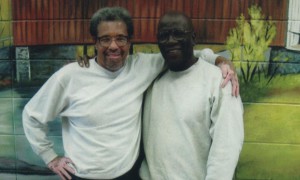
On Dec. 4, while shackled and chained, needing assistance to turn the pages of the decision by the U.S. Court of Appeals for the 5th Circuit, revolutionary Albert Woodfox received the news that his sentenced has finally been overturned. His release date has not been set. Woodfox is the only remaining incarcerated member of the Angola 3.
Albert Woodfox, 67, is the longest held prisoner in solitary confinement in U.S. history—held in an 8×6 cell for 23 hours a day for 42 years.
Judges of the 5th circuit court upheld a lower court’s decision that his 1972 conviction was attained by racially discriminatory means. In 1993, Woodfox’s sentence was overturned after it was shown that the selection of a white foreperson of the jury presented a racist pattern on the part of the state. Woodfox was soon after re-indicted by the racist Louisiana courts for the 1971 murder of a prison guard during a rebellion—a crime that the three revolutionaries did not commit.
The struggle of the Angola 3 has highlighted the torture of solitary confinement used against prisoners in the US. They exemplified the fight against the racist prison industrial complex and mass incarceration that has grown exponentially over the decades they have been locked up in solitary confinement. The conditions and history of Angola Prison could provide no better example as it was built on the grounds of a former slave plantation.
The crime of solitary confinement in the U.S.
The Angola 3 have endured unimaginable torture being confined to a cell for most of their lives without any human contact. As a result, Albert Woodfox developed chronic claustrophobia.
“I feel like I am being smothered, it is very difficult to breathe, and I sweat profusely. It seems like the cell walls close in and are just inches from my face. I try to cope by pacing, or by closing my eyes and rocking myself,” he described in a 2008 document of the anguish of being locked in such a small space day after day to silence him as a member of the Black Panther Party and leader among the inmates at Angola.
The three members of the Angola 3 were sent to prison for armed robbery in 1971. Woodfox escaped from a courtroom and joined the Black Panther Party. Later while incarcerated in Angola State Penitentiary, the three worked to improve conditions for inmates. They organized petitions and hunger strikes to condemn segregation in the prison along with other demands to end violence and systemic rape.
The plight of the Angola 3 became known when former Black Panther, Malik Rahim, of New Orleans discovered the three men were still in prison. The case of the Angola 3 has garnered support from all corners of the globe pointing out the racism and horrendous conditions that prisoners in the U.S. endure, especially those in solitary confinement.
Herman Wallace died after just three days of freedom on Oct. 4, 2013. Robert King Wilkerson was released in 2001 after pleading to conspiracy to commit murder; he was in solitary for 29 years.
Free the Angola 3! Tear down the prison walls! End solitary confinement!






